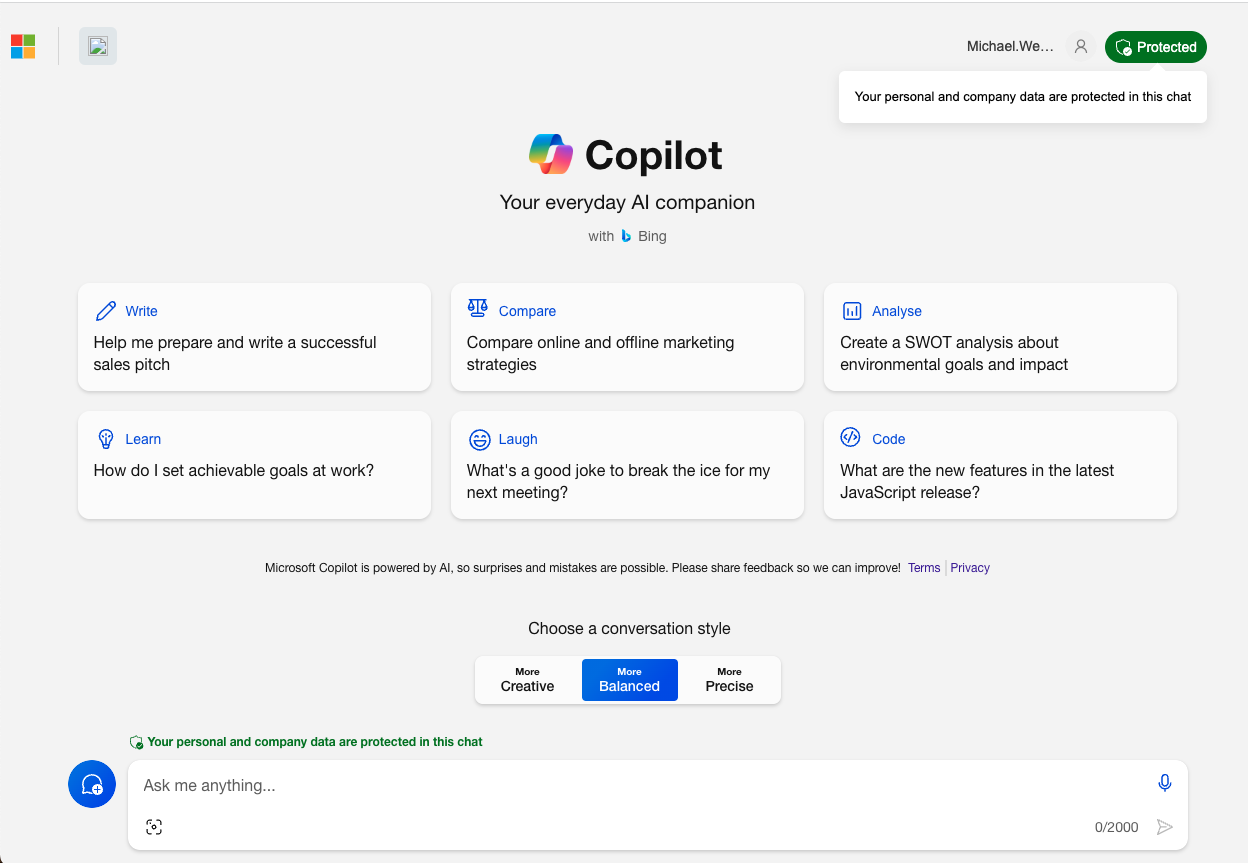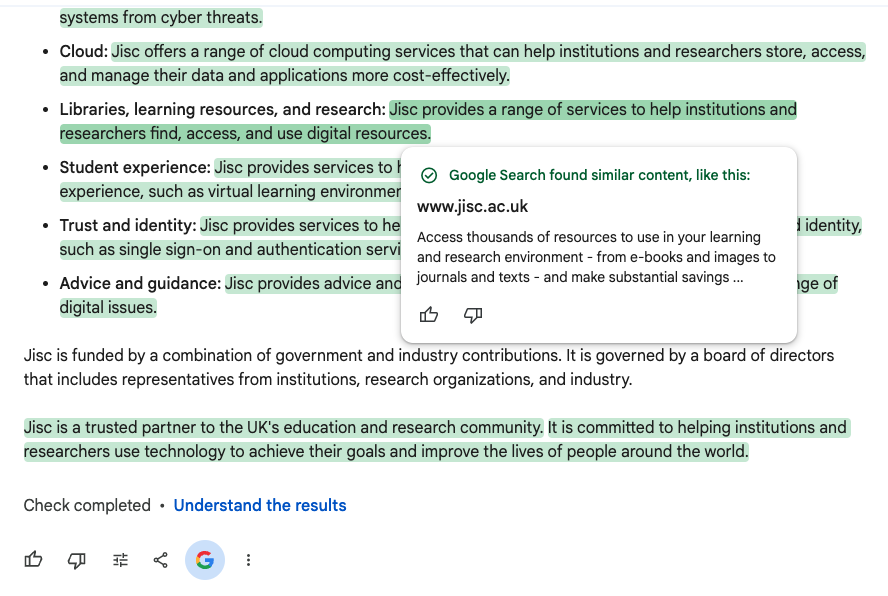
(note: last updated 16th Oct 2024 – see here for the update history.)
We are getting a lot of questions about licensing options for generative AI tools, so we thought it would be useful to summarise the current situation. It’s fair to say that things are still moving quickly, and there are a fair number of unknowns.
In this article, we are focussing on text-based tools, although many are now multimodal – i.e. can handle images, audio and increasingly video as well as text.
If you’d like to jump directly to a particular section here are direct links:
- The best option for most institutions right now: Microsoft Copilot
- Best free options: ChatGPT and Google Gemini
- The expensive but attractive option: Microsoft 365 Copilot
- Best paid option for most individuals (especially advanced users): ChatGPT Plus
- Best paid option for individuals who are heavily invested in Google’s ecosystem: Gemini Advanced
The best option for most institutions right now: Microsoft Copilot (was Bing Chat)
Cost: No additional cost to those institutions with A3 and A5 Microsoft licenses.
The best solution right now for providing safe enterprise-level access to generative AI is Microsoft Copilot. Until recently this was known as Bing Chat Enterprise, and you’ll still find it referenced as that in some of the documentation.
The reason we say this is that it it now provides Enterprise Data Protection – the same level of assurance as the rest of your Office 365 tenancy. This was changed from sightly lower Corporate Data Protection starting late September 2024.
Pros:
- Enterprise Data Protection
- Data not used for model training
- Powered by GPT4
- Cites sources (to a degree!)
- Multimodal (images as well as text)
Cons:
- No access to ChatGPT features like GPTs.
- No access to those under 18.
Additional comments:
Microsoft has confused everyone by renaming Bing Chat as ‘Copilot’, so we now have many different products with almost the same name! These include Microsoft Copilot (which was Bing Chat), Github Copilot (the coding tool), Microsoft 365 Copilot, which was what most people thought ‘copilot’ was referring to and is being built into Office, and Copilot in Windows (built into Windows 11). Here we are talking about the first option.
Also confusingly there is a product called Microsoft Copilot Pro which is only available to those with a family or personal subscription to Microsoft 365, rather than an academic subscription. Here we are talking about ‘Copilot’, not ‘Copilot Pro’
Copilot’s roots are in Bing as a search assistant/replacement. This means it will often start answering by performing a web search, and its choices of source can be of variable quality. You can control the balance of search vs pure generative AI using a ‘choose conversational style’ option, although it probably isn’t that intuitive to most people. This means that although copilot is technically the most secure and based on the same model as ChatGPT Plus, users might well express a preference for the latter.

Best free options: Google Gemini and ChatGPT
We have previously recommended Google Gemini over ChatGPT as the best free option, as ChatGPT was running a much older model. This changed in May 2024, and now ChatGPT Free users having access to the latest GPT-4o model. We are therefore recommending them both equally.
Best Free Option 1: ChatGPT (free)
Be sure to provide clear guidance on data privacy – data is not secure.
Cost: Free
The ‘hoover’ of the generative AI world, and the one that most people first think of. Following the updates in May, ChatGPT (free) is now running the latest models, and provides multimodal features. The main disadvantage is that it will fall back to the old GPT 3.5 model when you hit your free GPT-4o limit, whereas the paid version reverse to GPT-4.
Cost: free
Pros:
- The original!
- Fast
- A very uncluttered user experience
Cons:
- No corporate-level data protection features.
- Reverts to old GPT-3.5 model once you hit your usage limit.
Best Free Option 2: Google Gemini
But be sure to provide clear guidance on data privacy – data is not secure.
Cost: Free
Gemini is also available as a paid version, which we have noted separately.
Pros:
- Powered by new Gemini model
- Multimodal (images as well as text)
- Access to the internet
- A nice ‘double-check response’ feature.
Cons:
- No corporate-level data protection features.
- Data used for model training
- No access to under 18s
Additional comments:
Gemini has come on hugely over the last few months, and it’s new Gemini model looks promising. It’s got one feature that should be particularly useful for education – a button to ‘double-check’ responses. Essentially it performs a web search on the content and tells you which it could find a source for, and where. You might ask why it doesn’t do this all the time, and I think it’s just down to speed.

Best paid option for individuals (especially advanced users): ChatGPT Plus
Be sure to provide clear guidance on data privacy – data is not secure.
If you are a heavy generative AI user then ChatGPT Plus might be well worth it.
However, with the standard version, there is no real way to provide enterprise access. Payment is per individual, with each individual needing to enter credit card details.
There is an enterprise edition, but at the moment access to this is very limited. We have had no response from OpenAI about it when we made enquiries, so it can probably be discounted for now as an option for universities and colleges.
This makes ChatGPT Plus more of a personal than an enterprise tool.
Cost: $20 a month
Pros:
- Powered by the newest GPT 4 model
- Multimodal (images as well as text)
- Access to the internet
- Access to features like GPTs
Cons:
- No corporate-level data protection features.
- Payment requires each user to enter card details.
- Data used for model training by default
Additional comments:
ChatGPT Plus mobile application is also excellent (outside of work I use this all the time!).
OpenAI is releasing new features to ChatGPT Plus first, and although making it available to all users is impractical, most institutions will want to make it available to a few users, particularly those tasked with keeping abreast of AI developments, to help understand what is coming.
As with ChatGPT (free) you can opt out of your data being used for training. This, however, disables the chat history feature and makes the tool fairly useless for most people. So no personal data etc should be entered.
Best paid option for those who are heavily invested in Google’s ecosystem: Gemini Advanced
But be sure to provide clear guidance on data privacy – data is not secure unless as part of a enterprise subscription.
Cost:
Individuals: £18.99 (but this gives all Google One features)
Enterprise: $20 a month
Gemini Advanced is still fairly new at the time of writing, so hasn’t been tested as extensively as the other options in this post. It’s either available directly to individuals as as an add-on to an enterprise Google Workspace subscription.
The individual subscription includes Google One, which gives access to amongst other things, 2TB of storage for which would otherwise pay £7.99.
This also includes direct integration in Gmail, Docs, Slides, Sheets, and Meet, which is likely to be attractive if you are heavy user of those tools.
Following controversy about it’s image generation, this features has been withdrawn.
Pros:
- Powered by the newest Gemini Advanced model
- Multimodal (can read images as well as text)
- Access to the internet
- A nice ‘double-check response’ feature.
- Cheaper than Microsoft equivalents, especially of you need all the other Google features included in Google One
Cons:
- Unproven
- Fairly Expensive.
- No image generation at the moment (although it should be reinstated).
The expensive but attractive option: Microsoft 365 Copilot
Cost: $30 per month per user
Not to be confused with Microsoft Copilot (!) – this is the version built in Office 365. As from 15th January 2024 it was made available to all academic license holders (A3 and A5).
This costs $30 per month per user, which is around £290 per year at today’s exchange rate.
It’s possible that this might be good value for very targeted use, but not feasible for institutional rollout – at £294.40 per user per year, it would cost over £5million to provide it to all students at a 20,000 student institution.
We are running a small pilot at Jisc, so shortly so we can give guidance on whether and where it is value for money. We’ll update as we have more news, and have shared some very initial thoughts.
One thing to note, is that this version gives the very strongest data protection. Microsoft say:
Microsoft Copilot for Microsoft 365 is compliant with our existing privacy, security, and compliance commitments to Microsoft 365 commercial customers, including the General Data Protection Regulation (GDPR) and European Union (EU) Data Boundary.
So data isn’t used for training, and doesn’t leave your Office 365 tenancy or geographic region. The exception to this is if you enable the web plugin, in which case a search based on your prompt will be sent to Bing.
Pros:
- Strongest data protection
- Powered by the newest GPT 4 model
- Multimodal (images as well as text)
- Access to corporate data
- From the videos, lots of timesaving and creative features
Cons:
- Unproven
- Expensive.
Providing Indirect Access to Generative AI: Teachermatic
(other similar tools existing in this space).
Cost: Free to £18 a month
The other way of providing access to generative AI is via a tool that is powered by Generative AI. We’ve focussed our answer on Teachermatic as an example, as we are currently piloting it.
By default, data submitted to the model via the APIs isn’t used for training, which makes them much more secure. Obviously the user experience is very different to just using a chatbot. This might well be just the thing for specific tasks, like the generators for common teaching activities in Teachermatic, but it’s not a more general solution.
Pros:
- Data not used for model training
- Prompting skills are not required.
Cons:
- Not a general-purpose tool
For the more adventurous power user: Anthropic Claude
We are including Claude as a recommendation for the first time in our June 26 update, as it has enough interesting features to make it well worth exploring if you want to look at LLMs in more depth. This is partly driven by the release of their ‘Sonnet 3.5’ model on June 21st. It has one of the most powerful model right now, and it has a unique feature called ‘artefacts’ that let you generate and content in window, including websites and diagrams.
Pros:
- One of the most powerful models.
- An interesting ‘artefacts’ feature allowing interactive creation of certain visual outputs such as diagrams and websites.
Cons:
- No access to the internet.
- Limited free access.
And finally…
There are many other Generative AI tools that we haven’t mentioned. These include other similar tools like Perplexity, tools for specific tasks like Gamma, and tools built into social networking, like Snapchat, along with the many creative tools. We’ve also not talked about open-source options – for most people, we don’t think self-hosting is a viable option at the moment. Let us know if you would like us to explore any of those in more detail.
Updates:
10 Oct 2024
Microsoft Copilot updated to reflect the change from Commercial to Enterprise data protection
26 June 2024
ChatGPT made an equal recommendation to Gemini for a free model following its May 2024 update.
ChatGPT details updated following May 2024 update.
Claude added.
‘No chat history’ added as a ‘con’ for Copilot, as we increasingly getting feedback that this is limiting for users.
10 May 2024
The sections on Copilot/Copilot for 365 were updated to clarify the difference between the data protection offered. The Copilot 365 section was updated to reference the initial Jisc blog post on our experience with Copilot 365. The price of Copilot 365 was changed to ‘around £290’ rather than a precise figure on a specific days exchange rate.
4 Mar 2024
Addition of a new section Best paid option for individuals who are heavily investing in Google ecosystem: Gemini Advanced, and update of name from Bard to Gemini.
16 Jan 2024
The section ”The expensive but attractive option: Microsoft 365 Copilot’ has been updated to reflect Microsoft announcing the removal of the 300 user requirement’, and the Copilot section updated to explain that it isn’t talking about Copilot Pro.
16 Dec 2023
The section ‘The option that many people are waiting for: Microsoft 365 Copilot‘ was renamed ‘The expensive but attractive option: Microsoft 365 Copilot’ after Microsoft announced it would be made available to A3 and A5 licenses on the same terms.
Find out more by visiting our Artificial Intelligence page to view publications and resources, join us for events and discover what AI has to offer through our range of interactive online demos.
For regular updates from the team sign up to our mailing list.
Get in touch with the team directly at AI@jisc.ac.uk

2 replies on “Licensing Options for Generative AI”
Would it be useful to include tools like Research Rabbit / Consensus as tools that are custom-designed to support literature reviews etc., and image generation tools (e.g. Firefly, which is part of Adobe anyway & thus available to many in HE). Or would these go into a more dedicated specialist tools post?
Thanks, yes, good suggestion. I think I’d probably do a separate post for each area, but this is certainly something we can look at doing.